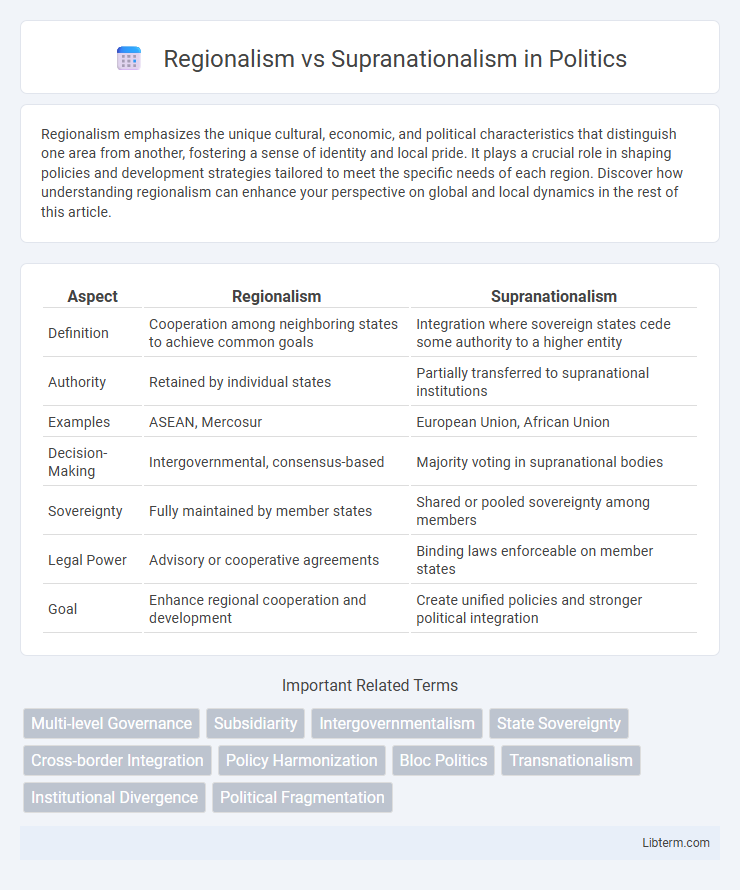Regionalism emphasizes the unique cultural, economic, and political characteristics that distinguish one area from another, fostering a sense of identity and local pride. It plays a crucial role in shaping policies and development strategies tailored to meet the specific needs of each region. Discover how understanding regionalism can enhance your perspective on global and local dynamics in the rest of this article.
Table of Comparison
| Aspect | Regionalism | Supranationalism |
|---|---|---|
| Definition | Cooperation among neighboring states to achieve common goals | Integration where sovereign states cede some authority to a higher entity |
| Authority | Retained by individual states | Partially transferred to supranational institutions |
| Examples | ASEAN, Mercosur | European Union, African Union |
| Decision-Making | Intergovernmental, consensus-based | Majority voting in supranational bodies |
| Sovereignty | Fully maintained by member states | Shared or pooled sovereignty among members |
| Legal Power | Advisory or cooperative agreements | Binding laws enforceable on member states |
| Goal | Enhance regional cooperation and development | Create unified policies and stronger political integration |
Defining Regionalism and Supranationalism
Regionalism emphasizes cooperation and integration among neighboring countries within a specific geographic area to promote economic, political, or cultural objectives. Supranationalism involves transferring authority from individual states to an overarching entity that holds decision-making power beyond national governments, enabling collective governance. Regionalism often serves as the foundation for supranational institutions, which aim to achieve deeper integration and policy harmonization among member states.
Historical Background and Evolution
Regionalism emerged in the 19th century as nations sought economic and political collaboration within geographically proximate areas, exemplified by organizations like the European Coal and Steel Community in the 1950s. Supranationalism evolved as a response to the limitations of regional cooperation, emphasizing the transfer of sovereignty to overarching institutions such as the European Union, which was formally established by the Maastricht Treaty in 1993. This evolution reflects a shift from intergovernmental agreements to deeper political and economic integration aimed at unified decision-making beyond national boundaries.
Key Principles and Characteristics
Regionalism emphasizes cooperation and integration among neighboring states, prioritizing shared cultural, economic, and political interests to strengthen regional identity and autonomy. Supranationalism involves member states ceding a degree of sovereignty to higher institutions that possess authority to make binding decisions, fostering deeper political and economic integration beyond simple cooperation. Key characteristics of regionalism include voluntary cooperation and intergovernmental agreements, while supranationalism is defined by legal and institutional frameworks granting collective governance and enforcement powers.
Notable Examples Around the World
The European Union exemplifies supranationalism by integrating member states under common policies and governance structures, promoting deeper economic and political unity. In contrast, NAFTA (now USMCA) represents regionalism through a trade agreement preserving national sovereignty while facilitating economic cooperation among the United States, Mexico, and Canada. ASEAN balances regionalism and supranationalism by fostering economic collaboration and political dialogue among Southeast Asian nations without ceding significant sovereignty.
Political Implications and Governance
Regionalism fosters political cooperation and governance within specific geographic areas, reinforcing sovereignty and tailored policy-making among member states. Supranationalism transfers decision-making authority to higher institutions, enhancing collective governance but often reducing individual state autonomy. The political implications include shifts in power dynamics, where supranational bodies can implement binding regulations, reshaping traditional state governance and accountability frameworks.
Economic Integration and Trade Impact
Regionalism fosters economic integration by creating trade blocs like NAFTA and the EU, which reduce tariffs and harmonize regulations among member countries, boosting intra-regional trade and investment flows. Supranationalism takes economic integration further through institutions with authority above national governments, such as the European Union's single market and customs union, enhancing cross-border trade efficiency and economic policy coordination. The trade impact of regionalism is often limited to participating countries, while supranationalism facilitates deeper integration with standardized rules, promoting larger-scale trade expansion and economic stability across a wider area.
Sovereignty: Protection vs. Pooling
Regionalism emphasizes protecting national sovereignty by maintaining state control over political and economic decisions within a defined geographic area, fostering cooperation without compromising autonomy. Supranationalism involves pooling sovereignty, where member states delegate authority to a higher organization, enabling collective decision-making and binding policies that transcend national borders. This transfer of sovereignty facilitates integrated governance, enhancing regional stability and economic coordination but requires member states to cede some control over their domestic affairs.
Social and Cultural Dimensions
Regionalism emphasizes the preservation and promotion of unique social identities, cultural heritage, and local traditions within specific geographic areas, fostering a strong sense of community and shared values. Supranationalism encourages the blending of diverse cultures and social norms to create a broader, more inclusive identity that transcends national boundaries, supporting multiculturalism and cross-cultural cooperation. Cultural integration under supranationalism often faces challenges in balancing respect for regional diversity with the goals of political and economic unity.
Advantages and Challenges of Each Approach
Regionalism promotes economic integration, cultural cohesion, and political cooperation among neighboring countries, enhancing localized decision-making and tailored policies. Supranationalism offers broader collective governance, stronger enforcement mechanisms, and pooled sovereignty, which can lead to more uniform regulations and greater global influence. Challenges of regionalism include limited scale and potential exclusion of non-member states, while supranationalism faces issues of national sovereignty loss, complex bureaucracy, and slower decision-making processes.
Future Trends and Global Implications
Future trends indicate a growing complexity in the interplay between regionalism and supranationalism, as entities like the European Union push for deeper integration while regional blocs in Asia and Africa emphasize sovereignty and economic collaboration. The rise of digital economies and transnational challenges such as climate change and cybersecurity necessitate stronger supranational governance frameworks to effectively coordinate policy and resource allocation. These dynamics shape global implications by redefining power structures, influencing trade agreements, and fostering new diplomatic alliances that transcend traditional nation-state boundaries.
Regionalism Infographic

 libterm.com
libterm.com